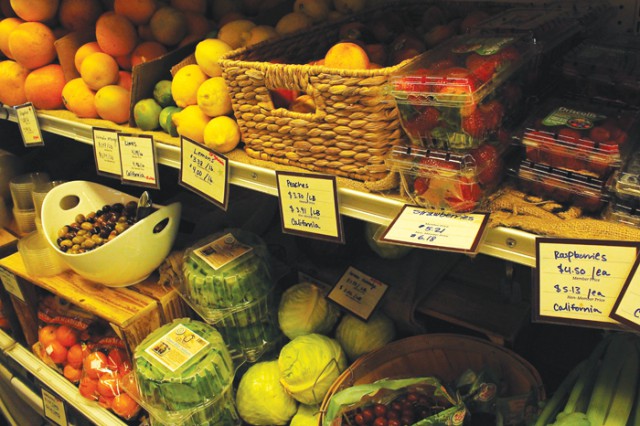
Boulder’s first food co-op, The Second Kitchen, is trying to make a bigger difference when it comes to quality and sustainability of food distribution, while not forgetting their humble beginnings. The organization’s name is a tribute to those humble begins, when co-founder Sara Brody once used the second kitchen of her duplex to house large sacks of grains and other products for it’s first few years as a buy-in club.
Brody understands that in order to make a more substantial difference in the food industry, the food cooperative has to become more accessible to the public. But at the same time, she also wants to hold true to the founding member’s initial reasons for creating the club in the first place, which was the concept of creating a community dedicated around food mindfulness and quality.
The idea of creating a food co-op in Boulder started bubbling in Brody’s mind after she attended a conference called the Real Food Campaign in Montana, which promoted local food consumption on college campuses. She bounced around the idea with two of her friends, Beth Burzynski and Sabina Bastias. A year later the three co-founders got 18 households together in order to make their first purchases as a buy-in club, where each household contributed money to buy in bulk to get a cost break on locally sourced food.
“Our mission then, and it is still today, is to create a community around food buying due to the fact that people are so disconnected from knowing where their food comes from and how it gets to them,” says Brody.
According to Brody, the club’s goal was not just to find a more sustainable way to acquire their food, but to share and create a community around really good food, to educate their members on where and how the food was being produced, and to create an excitement about this knowledge in order to create change. This dedication to community is why the founders decided to transition into a public co-op; opening their storefront on the corner of 9th Street and College Avenue to anyone, not just members, on Sept. 5, 2013.
Members pay a fee that makes them partial owners of the business, allowing them to make decisions on what is carried in the store. The membership fee is $350, but with two and half hours of volunteer work a month it’s $135, and because the organization has roots with student participation, the student cost break is $100. Each tier of membership allows for the participation of six people per entry.
“It’s really about the trust I have in the other members of the co-op,” says Laura Brunner, a member who joined this January. “I know that I don’t have to be the only one person on the island doing all the research on my own. Members are able to fill you in on where certain products come from. This allows for you, as a member, to access the knowledge of the whole community.”
Brunner is a student and a mother, living just a few blocks away from the store, who joined because of accessibility. She believes that doing a few hours of volunteer work is a reasonable exchange for the 20 percent discount she receives on quality food as a member.
Because the store does not have the diversity in products and produce of larger stores, Brunner contributes to the co-op community by submitting recipes that only use the products available in the store.
“If we don’t have an ingredient, then we’ll assist in finding an alternative,” says Brody. “For some people it’s hard because cooking is so daunting anyway, but we provide a certain amount of encouragement, and that has to do with the relationships that are built through the co-op membership.”
Having members volunteer allows the co-op to have a small paid staff of three, which permits the organization to keep costs down in that respect, but it’s harder in other areas. For instance, they don’t get the price cut that bigger stores get for larger purchases, but the smaller purchas es is what keeps the co-op’s waste amount down to a minimum. Leigh Kroeker, the first ever paid employee of the co-op, had the experience of working for Whole Foods previously, and one of her reasons for leaving the larger grocer was the amount of waste they created everyday by throwing out produce.
“Hopefully people can respect that we’re not Whole Foods,” says Kroeker. “We are not going to have huge stacks of produce because that’s how waste is created. It’s the first defense line against waste, not ordering as much. Instead, we order more frequently, and know our sources in order to make sure it is the freshest possible.”
Brody says that she has had to learn quickly when it comes to distributers, considering that they have branched out from 50 to 1,000 items in less than a year’s time.
“I do all the food purchasing and order as needed,” says Brody. “It’s strategic in making sure we have no waste.”
Brody actually grew up on a sustainable farm, giving her some knowledge on what questions to ask the distributers about their products. She expects details in their answers to help her determine if they are “green washing” — painting the picture of sustainability without actually using sustainable practices.
Her strictness on quality allows her to maintain her loyalty to some of the farms that have supported the organization since the very beginning, such as Jodar Farms, owned by Aaron Rice, which is now one of Second Kitchen’s two egg suppliers. While the co-op has grown so much that Jodar Farms can’t always meet the demand for eggs, Brody says they still use the farm as a supplier because of the quality of its product.
“We do what we say we are doing,” says Rice. “We actually do provide the chickens with free range pastures, giving them access to bugs and compost pile. When you actually do those things, the chickens are able to eat what they want, a more diverse diet that will eventually lead to better eggs.”
It’s this dedication to quality that has built lasting relationships that allow the co-op store front to carry specialty items, such as Oxford Garden cucumbers and exclusive Shamane’s bake shop pastries. The co-op has even seen some products take off after starting in their store, such as Jackson Chips. Jackson Chips, which is now carried in hundreds of stores, is still hand deliver to the co-op. Brody values this respect and closeness displayed by distributors and the members of the co-op and she believes that these relationships are the greatest contributors to the buy-in club’s success.
Respond: [email protected]














